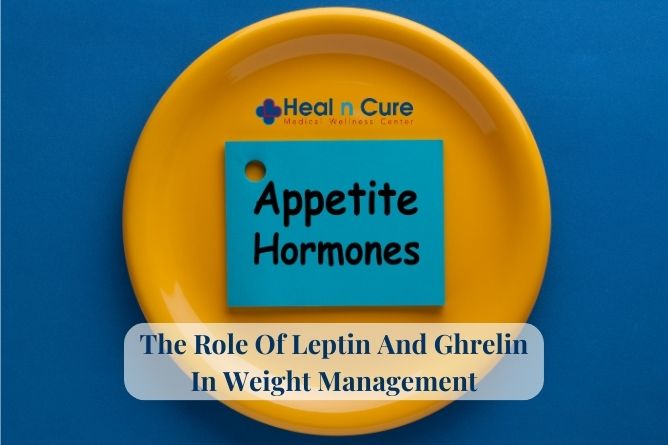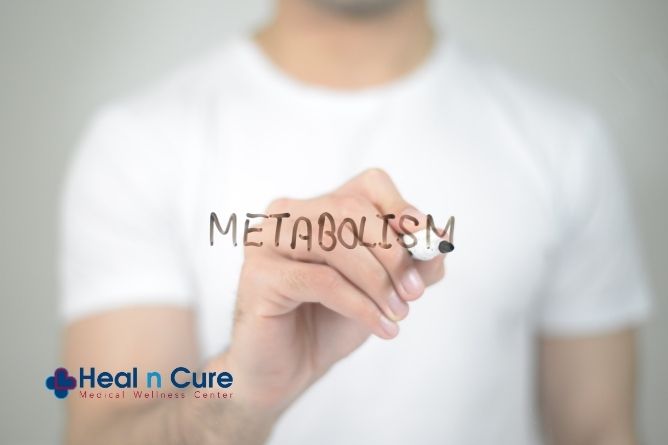
The Role Of Leptin And Ghrelin In Weight Management - Heal n Cure Medical Wellness Center
Weight management can be a bit of a challenge. Leptin and ghrelin are two key hormones that play an important role in this process. They help regulate hunger, metabolism, and body weight.
Gaining an understanding of these hormones is incredibly helpful for effective and sustainable weight loss.
Leptin, often referred to as the satiety hormone, signals our brain when we’re full. Ghrelin, on the other hand, tells us when it’s time to eat. If their levels get thrown off balance, it messes with our appetite and how much we eat.
Keeping these hormones in check is really important for managing weight effectively. In cities like Chicago—and everywhere else—many folks struggle with obesity due to hormonal imbalances involving leptin and ghrelin.
Key Takeaways
- Leptin and ghrelin are hormones that regulate hunger and fullness. Leptin signals the brain when you’re full, while ghrelin tells you when to eat.
- Hormonal imbalances in leptin and ghrelin can lead to weight gain by disrupting hunger signals. Obesity often involves leptin resistance, causing constant hunger despite high leptin levels.
- Managing diet, exercise, sleep, and stress helps balance these hormones. Healthy habits can support effective weight management.
- Heal n Cure Medical Wellness Center offers programs targeting hormonal issues linked with obesity for better long-term weight loss outcomes.
What Are Leptin and Ghrelin?
Leptin and ghrelin are hormones that control our hunger. Leptin helps curb appetite by signaling the brain to reduce food intake, while ghrelin encourages eating by stimulating hunger.
Leptin: The Satiety Hormone
Leptin plays a critical role in regulating appetite and body weight by signaling the brain when we’ve had enough to eat. As we gain body fat, leptin levels increase, which should ideally reduce hunger and limit food intake. The OB gene, located on chromosome 7, is responsible for producing leptin, a hormone essential for regulating fat storage.
However, many individuals with obesity experience leptin resistance, where high levels of leptin fail to suppress hunger as they should. This resistance results in persistent overeating and continued weight gain, despite elevated leptin levels in the bloodstream. Addressing leptin resistance is crucial for effective medical weight management, and at Heal n Cure Medical Wellness Center, we focus on solutions that target these underlying hormonal imbalances to improve long-term health outcomes.
Ghrelin: The Hunger Hormone
Ghrelin, known as the hunger hormone, is produced mainly in the stomach. This hormone signals our brain to feel hungry by binding to the growth hormone secretagogue receptor (GHS-R).
Ghrelin levels typically rise before meals and fall after eating. This pattern helps regulate meal timing and portion sizes.
Although ghrelin levels are lower in obese individuals, they can still experience heightened hunger responses due to disrupted ghrelin signaling.
Balancing this hormone involves paying attention to factors like diet, sleep, and stress levels. Now let’s explore how hormonal balance affects weight gain next.
How Hormonal Imbalance Affects Weight Gain
Imbalances in leptin and ghrelin can lead to weight gain by disrupting our body’s hunger signals. Poor diet, lack of sleep, and stress can also impact these hormones, making it hard to lose weight.
Hormonal Imbalance and Weight Gain
Leptin and ghrelin play key roles in weight control. Leptin tells our body when we are full, while ghrelin signals hunger. Disruptions in these hormones can cause big problems. High levels of leptin should reduce appetite, but many obese people have leptin resistance.
Their bodies ignore the high leptin levels, leading to increased hunger and food intake.
Ghrelin spikes when we fast. This rise in ghrelin makes it harder for individuals to maintain weight loss as their body signals for more food. Hormonal imbalance leads to uncontrolled appetite and weight gain even if calorie intake doesn’t seem excessive.
These imbalances turn simple dieting into a complex challenge due to constant feelings of hunger or satiety issues.
The Connection Between Metabolism and Hormones
Metabolism and hormones work together to manage our weight. Leptin tells our brain when we are full, while ghrelin makes us feel hungry. Changes in these hormone levels can slow or speed up how we burn calories.
This can make it easier or harder to lose weight. Find out more in the next section!
How Leptin and Ghrelin Influence Metabolism
Leptin and ghrelin play big roles in metabolism. Leptin helps regulate our long-term energy balance. High levels of this hormone signal that we have enough stored fat. This means our body can use the stored fat for energy instead of seeking more food.
Low leptin levels often trigger hunger and the need to eat.
Ghrelin, on the other hand, is known as the “hunger hormone.” It signals us to eat when our stomach is empty. While ghrelin doesn’t directly slow down metabolism, continuous hunger signals can lead to overeating, contributing to metabolic imbalances.
This can lead to weight gain over time since our body might store more fat instead of burning it off.
Our experience shows that balancing these hormones boosts weight loss efforts significantly by stabilizing both appetite regulation and energy expenditure.
Achieving Hormone Balance for Weight Loss
To manage weight, we must balance leptin and ghrelin levels. Eating whole grains, exercising regularly, getting enough sleep, and managing stress can help regulate these hormones.
For those struggling with hormonal issues related to weight loss, Heal n Cure’s medical weight-loss program program might be a solution worth exploring.
Practical Steps to Balance Hormones Naturally
Eating a healthy diet can help balance our hormones. We should include whole foods like vegetables, fruits, and whole grains. Reducing sugar intake is crucial for managing weight loss resistance.
High-fat meals lower 24-hour circulating leptin levels compared to high-carbohydrate meals. For instance, choosing a balanced meal with lean proteins and veggies can optimize our hormone levels.
Regular exercise also helps in balancing hormones naturally. It improves insulin sensitivity and lowers inflammation. Activities like walking, running, or yoga are beneficial. Optimizing sleep hygiene is another vital step; aim for seven to eight hours of good-quality sleep each night for better hormonal balance.
Obesity and Hormone Levels: A Complex Relationship
Obesity and hormone levels share a complex relationship that involves leptin and ghrelin. In obesity, elevated leptin levels should help suppress hunger, but they don’t because the body becomes resistant to it.
This phenomenon is called leptin resistance. As a result, the appetite remains high despite having enough or even too much stored fat.
On the other hand, decreased ghrelin levels might seem beneficial since ghrelin drives hunger. But this imbalance can lead to disrupted energy homeostasis. Despite reduced ghrelin, people may still gain weight due to overeating and low metabolic rates influenced by this hormonal dance.
Addressing these imbalances in a medical weight loss program can support long-term success by targeting the root hormonal issues linked with severe obesity.
Conclusion
Leptin and ghrelin play crucial roles in weight management. Higher leptin levels are associated with insulin resistance. Optimal balance of leptin, ghrelin and insulin is crucial to regulate hunger and fullness, impacting our food intake. Balancing these hormones can aid in weight loss effectively.
At Heal n Cure, we offer expert guidance for those facing hormone-related weight issues. Consult with Dr. Meena or book an appointment through our website today!
Frequently Asked Questions (FAQ)
Q: What are leptin and ghrelin, and how do they affect weight management?
A:Leptin and ghrelin are satiety hormones that play a key role in weight management. Leptin helps regulate fat mass by signaling the brain to reduce appetite when energy stores are sufficient. Ghrelin, produced in the stomach, stimulates hunger and increases food intake.
Q: How can hormone therapy aid in weight loss?
A: Hormone therapy for weight loss aims to balance levels of leptin and ghrelin. By adjusting these hormones, it may help control appetite, improve insulin resistance, and support better body composition.
Q: Are there natural ways to balance leptin and ghrelin?
A: Yes, natural ways include following a balanced diet rich in proteins and healthy fats while limiting carbohydrates like sucrose or fructose. Regular sleep also helps maintain proper hormone balance.
Q: Can surgical procedures impact leptin and ghrelin levels?
A: Yes, surgeries such as gastric bypass surgery or sleeve gastrectomy can alter leptin and ghrelin levels significantly. These changes often lead to reduced caloric intake due to decreased hunger signals from the digestive system.
Q: How does sleep deprivation affect these hormones?
A: Sleep-deprived individuals often have higher levels of ghrelin which increases hunger while reducing leptin that signals fullness leading to increased caloric intake over time contributing towards obesity.
Q: What is the relationship between diet-induced obesity (DIO) and these hormones?
A: Diet-induced obesity disrupts normal functioning of both leptins’ ability at regulating adiposity causing high-fat diets resulting into resistance whereas elevated ghrelin promotes excessive eating ultimately affecting overall cardiovascular health negatively


